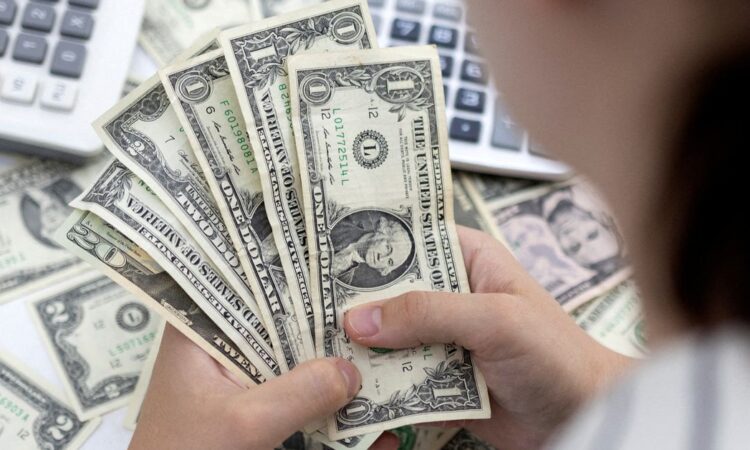
LONDON/NEW YORK, Feb 28 (Reuters) – The dollar was flat to slightly lower against major currencies on Tuesday in choppy trading, after a round of mainly weak economic data, but still on track for its first monthly gain since September, as investors wagered that interest rates will remain elevated for some time.
The greenback’s overall rally this month gathered momentum in recent weeks as upbeat economic data led to mounting expectations that the Federal Reserve will have to raise interest rates more than initially expected.
U.S. rate futures have priced in a peak fed funds rate, the Federal Reserve’s target policy rate, of 5.4% hitting in September. The market has all but priced out rate cuts this year.
“The market has repriced the Fed and it now sees a higher terminal rate and low scope for cuts for the rest of the year. And that’s what the dollar strength reflects,” said Vassili Serebriakov, FX strategist, at UBS.
“The market started January with a strong dollar-bearish consensus and that trade has been unwound for the most part in February. But equities seemed to be quite resilient and that’s seemed to be limiting the dollar’s upside,” he added.
Latest Updates
View 2 more stories
The dollar index , which measures the currency against a basket of peers, was flat at 104.63, but was still set for a February gain of 2.4%, its first monthly increase since September.
U.S. Treasury yields have also moved higher with the inflation sensitive two-year yield back at three-and- a-half-month highs.
U.S. data on Tuesday showed signs of weakness creeping into the economy, slightly weighing on the dollar.
U.S. single-family home prices increased at their slowest pace in December since the summer of 2020. The S&P CoreLogic Case Shiller national home price index, covering all nine U.S. census divisions, increased 5.8% year-on-year in December, the smallest annual gain since August 2020, and followed a 7.6% rise in November.
The U.S. Chicago PMI, on the other hand, slid to 43.6 in February, weaker than expected, after falling to 44.3 in January.
U.S. consumer confidence also fell this month to 102.9, down from a revised 106 reading last month.
“The disinflation story continues. It took a bit of a pause in January, but it’s not a reversal. We think some of the dollar strength is exaggerated. So we are cautiously fading dollar strength,” UBS’ Serebriakov said.
The dollar on Tuesday gained particularly against the Japanese yen , climbing to 136.91 yen, its highest in more than two months. It last changed hands at 136.28 yen, flat on the day.
Japan’s policy of keeping yields pinned down means the yen is sensitive to moves elsewhere. Incoming Bank of Japan (BOJ) Governor Kazuo Ueda said this week it was premature to comment on how the central bank may shift policy.
On Tuesday, incoming Deputy Governor Shinichi Uchida brushed aside the chance of an immediate overhaul of the BOJ’s ultra-loose monetary policy.
The yen also fell to its weakest levels in two months against the euro and the pound. ,
Elsewhere, the euro was little changed against the dollar at $1.0614. The euro pared earlier losses after higher-than-expected French inflation data, which sent short-dated euro zone yields to their highest in at least a decade.
Sterling , meanwhile, built on its gains from the previous session against the dollar, rising 0.5% to $1.2112.
It surged 1% on Monday after Britain and the European Union announced a new deal for post-Brexit trading arrangements for Northern Ireland, known as the Windsor Framework.
That brightened the outlook for the post-Brexit UK economy, with British Prime Minister Rishi Sunak saying it would clear the way for a new chapter in London’s relationship with the bloc.
The dollar also climbed 0.5% against the Swedish crown after data showed the country’s economy fared much worse than previously thought in the fourth quarter of 2022.
========================================================
Currency bid prices at 10:55AM (1555 GMT)
Reporting by Gertrude Chavez-Dreyfuss in New York and Alun John in London; Additional reporting by Rae Wee in Singapore; Editing by Edmund Klamann, Christopher Cushing, Simon Cameron-Moore, Alexander Smith and Ed Osmond
Our Standards: The Thomson Reuters Trust Principles.




